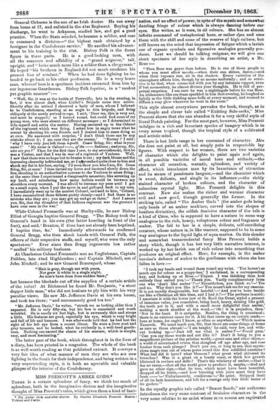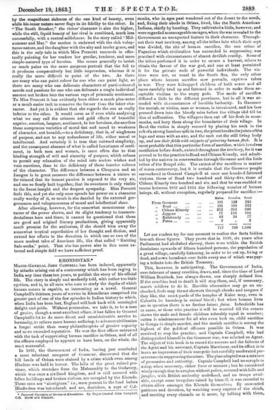MISS PRESCOTT'S AMBER GODS.'
THERE is a certain splendour of fancy, we think too much of splendour, both in the imaginative diction and the imaginative thought of Miss Prescott's tales, which gives them a kind of fasei-
* The Amber Gods and Whir Stories. By Harriet Elizabeth Prescott. Boston: Ticknor and Fields.
nation, end an effect of power, in spite of the mystic and somewhat dazzling fringe of colour which is always dancing before our
eyes. She writes, as it were, in oil colours. She has an almost infinite command of metaphorical hues, or rather dyes, and uses
them with the skill and some of the reserve of high culture, but still leaves on the mind that impression of fatigue which a lavish use of organic symbols and figurative analogies generally pro- duces. Lest we should be talking enigmas, we will give one short specimen of her style in describing an artist, a Mr. Rose :—
" Then Rose was gayer than before. He is one of those people to whom you must allow moods,—when their sun shines, dance,—aink when their 'vapours rise, sit in the shadow. Every variation of the atmosphere affects him, though by no means uniformly ; and so sensi- tive is he that, when connected with you by any intimate rapport, even if but momentary, he almost divines your thoughts. He is full of per- petual surprises. I am sure he was a nightingale before he was Rose. An iridescence like sea-foam sparkled in him that evening, he laughed as lightly as the little tinkling mass-bells at every moment, and seemed to diffuse a rosy glow wherever he went in the room."
This style almost everywhere pervades the book, though, as in the simple and clever tale called "Knitting Sale-socks," Miss Prescott shows that she can abandon it for a very skilful style of literal Dutch painting. For the most part, however, 31 iss Prescott indulges in a rich and luxuriant species of imagery which is in every sense tropical, though the tropical style of a cultivated and artistic mind.
There is but little range in her command of character. Men she does not paint at all, but simply puts in respectable lay figures. With respect to her women, there are two varieties of character which she delights to paint again and again, in all possible varieties of moral tone and attitude,—the character all sensation, warmth, splendour, and variety of effect, which intoxicates men by its luxuriance of attraction
and its steam of passionate languor,—and the character which is sweet, delicate, and single in its influence ;—the richly stained character of broken colours, and the character of
colourless crystal light. Miss Prescott delights in this contrast. Now, she makes the richer and warmer character evil and now good, though generally the former. In the
striking tale, called "The Amber Gods (the amber gods being only beads of an amber necklace, carved into the shapes of heathen divinities), the selfish feminine character of the tale is a kind of Circe, who is supposed to have a nature in some way analogous to the rich, heavy, voluptuous colour and fragrance of amber. The foil to her is a simple, delicate, self-sacrificing creature, whose nature is, in like manner, supposed to be in some way analogous to the liquid light of aqua marina. On this slender and somewhat transcendental fancy Miss Prescott builds a story which, though it has but very little narrative interest, is worked up by her lavish use of rich colour into something that produces an original effect. Here, for example, is the amber heroine's defence of amber to the gentleman with whom she has fallen in love :-
"I took my beads and wound them round my wrist. You haven't as much eye for colour as a poppy-bee,' I exclaimed, in a corresponding key, and looking up at Rose.—' Unjust. I was thinking then how entirely they suited you.'—' Thank you. Vastly complimentary from one who 'don't like amber'!'—' Nevertheless, you think so.'—' Yes and no. Why don't you like it?'—' You musn't ask me for my reasons. It is not merely disagreeable, but hateful.'—' And you've been beside me like a Christian all this time, and I had it !'—' The perfume is acrid; I associate it with the lower jaw of St. Basil the Great, styled a present of immense value, you remember, being hard, heavy, shining like gold, the teeth yet in it, and with a smell more delightful than amber,' making a mock shudder at the word.—' Oh! it is prejudice, then.' 'Not in the least. It is antipathy. Besides, the thing is unnatural ; there is no existent cause for it. A bit that turns up on certain sands,— here at home for ought I know, as often as anywhere.'—' Which means Nazareth. lire must teach you, Sir, that there are some things at home as rare as those abroad.'—' I am taught,' he said, very low, and with- out looking up.—' Just tell me what is amber ?'—' Fossil gam.' 'Can you say those words and not like it? Don't it bring to you a magnificent picture of the pristine world,—great seas and other skies,— a world of accentuated crises, that sloughed off age after age and rose fresher from each plunge ? Don't you see, or long to see, that myste- rious magic tree out of whose pores oozed this fine solidified sunshine? What leaf did it have? what blossom? what great wind shivered its branches ? Was it a giant on a lonely coast, or thick low growth blistered in ravines and dells ? That's the witchery of amber —that it has no cause,—that all the world grew to produce it, maybe,—died and gave no other sign, —that its tree, which must have been beautiful, dropped all its fruits,—and how bursting with juice must they have
been — Unfortunately, coniferous.'—' Be quiet. Stripped itself of all its lash luxuriance, and left for a vestige only this little fester of its gashes.'" In the equally graphic tale called "Desert Sands," our authoress introduces the very same contrast of feminine characters in t'ae very same relation to an artist whose m3re senses are captivated
by the magaiicent richness of the one kind of beauty, even while his-inner nature never flags in its fidelity to the-other. In "The South Breaker," the richer character is also the higher, while the still, liquid beauty of her rival is combined, much less successfully, with a central selfishness. In the story called "Mid- summer and May," the mother is endowed with the rich volup- tuous nature, and the daughter with the airy and tender grace, and this is the only tale in which Miss Prescott succeeds in effec- tually painting for her readers her gentler, tenderer, and more simple-natured type of heroine. She seems generally to lavish so much pains on the more gorgeous portrait that the foil to it produces comparatively but little impression, whereas it is really the more difficult to paint of the two. As there are many who can paint colour for one who can paint light, so there are many who can delineate characters of parti-coloured moods and passions for one who can delineate a single individual essence not broken into the various rays of prismatic sentiment. To Miss Prescott it has evidently been either a much pleasanter or a much easier task to conceive the former than the latter cha- racter. And yet it is evident that she regards the one as really inferior to the other. It would seem as if even while analyzing what we may call the crimson and gold effects of beautiful caprice, emotion, languor, sentiment, in her heroines, she ascribes these sumptuous varieties of moral tint and mood to weakness of character, not breadth,—to a deficiency, that is, of singleness of purpose, and not to any reduadance of life, either moral or intellectual. And certainly it is true that outward simplicity, and the consequent absence of what is called luxuriance of senti- ment, in both men and women, is more often due to that binding strength of will and sincerity of purpose, which refuses to permit any relaxation of the mind into useless wishes and vain emotions, than to the deficiency of these interior colours of the character. The difference between a Cleopatra and an Itnogen is in great measure the difference between a nature so far relaxed that its inmost passion is exposed to the very air, and one so firmly knit together, that its sweetness is only visible to the finest insight and the deepest sympathy. Miss Prescott feels this, and yet she only once spends her power on a character really worthy of it, so much is she dazzled by the external gor- geousness and voluptuousness of moral and intellectual sheen.
After allowing, however, for the somewhat monotonous cha- racter of the power shown, and its slight tendency to transeen- dentalisms here and there, it cannot be questioned that these are good and original literary productions, giving apparently much promise for the authoress, if she should trim away the somewhat tropical superfluities of her thought and diction, and extend her efforts in the direction in which one or two of the more modest tales of American life, like that called "Knitting Sale-socks," point. That she has power also in this more ex- ternal and simple field we have sufficient proof.



































 Previous page
Previous page